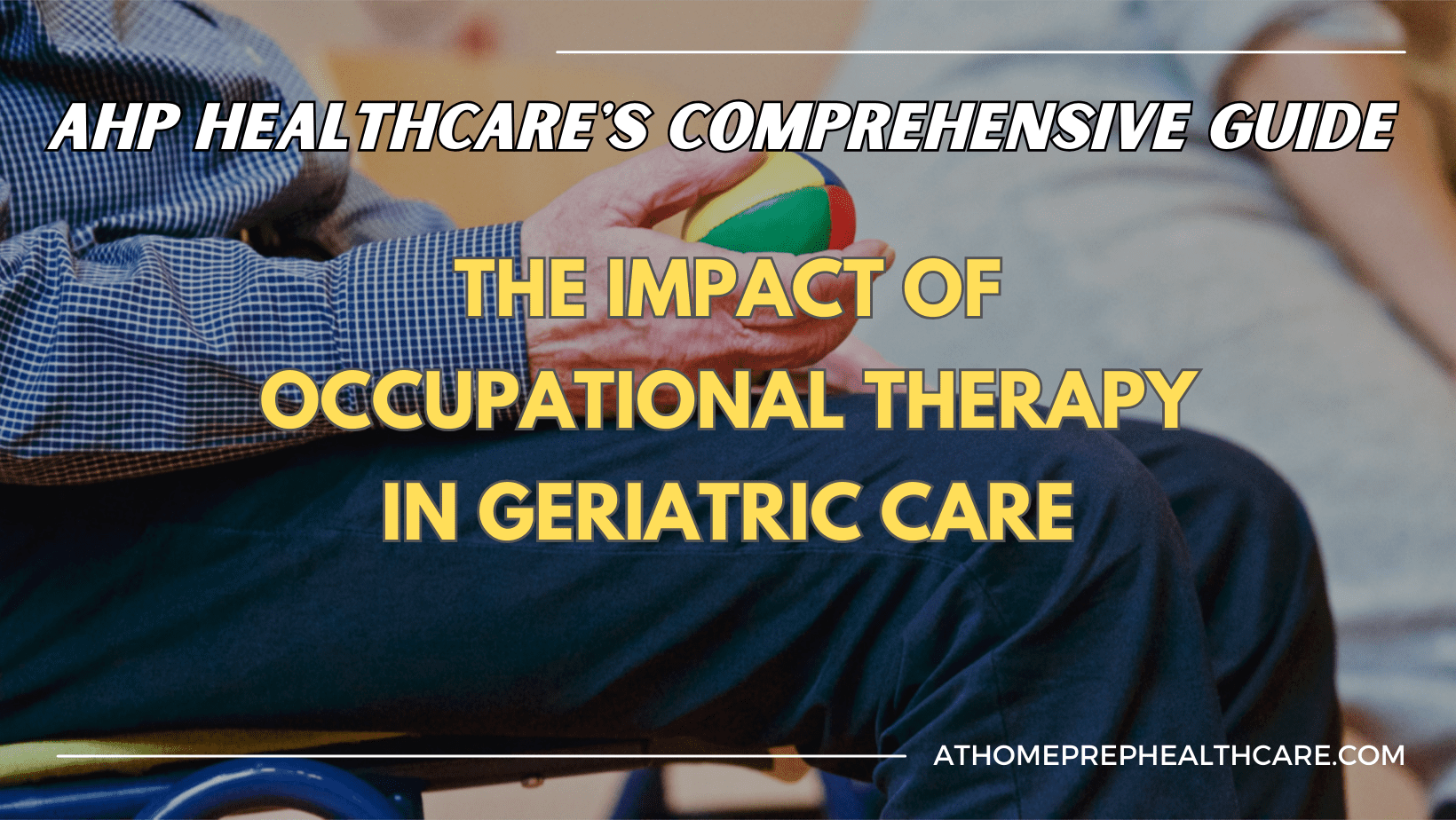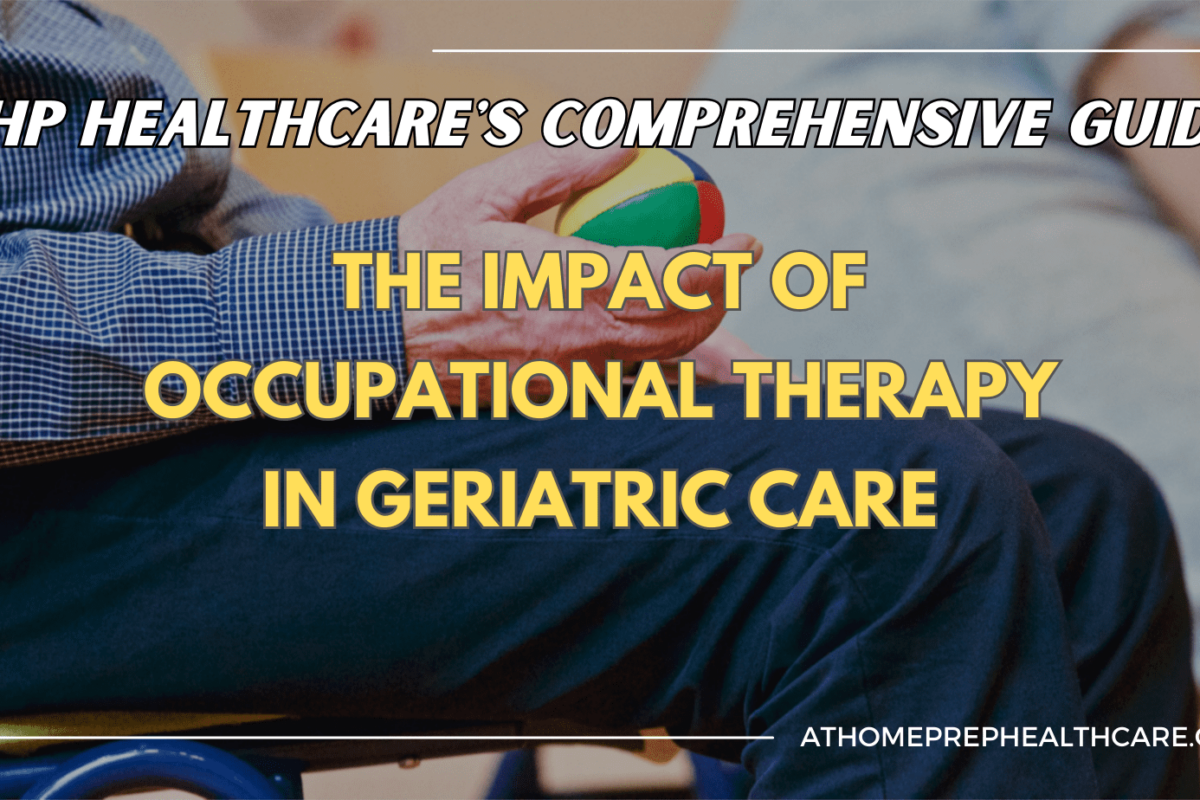 Aging is an inevitable part of life, and with it comes a unique set of challenges, particularly in maintaining independence and quality of life. As individuals grow older, they may face physical, cognitive, and emotional changes that impact their daily activities. This is where the role of occupational therapists in geriatric care becomes paramount. Occupational therapy (OT) empowers elderly patients to overcome obstacles, regain their independence, and lead fulfilling lives. In this blog, we will explore the valuable contributions of occupational therapists in enhancing the well-being of seniors, highlighting the profound impact they have on geriatric care.
Aging is an inevitable part of life, and with it comes a unique set of challenges, particularly in maintaining independence and quality of life. As individuals grow older, they may face physical, cognitive, and emotional changes that impact their daily activities. This is where the role of occupational therapists in geriatric care becomes paramount. Occupational therapy (OT) empowers elderly patients to overcome obstacles, regain their independence, and lead fulfilling lives. In this blog, we will explore the valuable contributions of occupational therapists in enhancing the well-being of seniors, highlighting the profound impact they have on geriatric care.
Understanding the Aging Process
Before delving into the role of occupational therapy in geriatric care, it’s crucial to understand the aging process. Aging can bring about a range of physical and cognitive changes, including: 1. Reduced Mobility: Seniors may experience a decline in mobility due to muscle weakness, joint stiffness, and conditions like arthritis. This can limit their ability to perform daily tasks. 2. Cognitive Changes: Memory issues, cognitive decline, and dementia are common concerns among the elderly. These conditions can affect decision-making, problem-solving, and overall independence. 3. Chronic Health Conditions: Seniors often manage chronic health conditions such as diabetes, heart disease, and hypertension, which require ongoing care and lifestyle adjustments. 4. Medication Management: With multiple medications to manage, seniors face challenges in adhering to medication schedules and understanding potential side effects. Aging is an inevitable part of life, and with it comes a unique set of challenges, particularly in maintaining independence and quality of life. As individuals grow older, they may face physical, cognitive, and emotional changes that impact their daily activities. This is where the role of occupational therapists in geriatric care becomes paramount. Occupational therapy (OT) empowers elderly patients to overcome obstacles, regain their independence, and lead fulfilling lives. In this blog, we will explore the valuable contributions of occupational therapists in enhancing the well-being of seniors, highlighting the profound impact they have on geriatric care.Understanding the Aging Process
Before delving into the role of occupational therapy in geriatric care, it’s crucial to understand the aging process. Aging can bring about a range of physical and cognitive changes, including:- Reduced Mobility: Seniors may experience a decline in mobility due to muscle weakness, joint stiffness, and conditions like arthritis. This can limit their ability to perform daily tasks.
- Cognitive Changes: Memory issues, cognitive decline, and dementia are common concerns among the elderly. These conditions can affect decision-making, problem-solving, and overall independence.
- Chronic Health Conditions: Seniors often manage chronic health conditions such as diabetes, heart disease, and hypertension, which require ongoing care and lifestyle adjustments.
- Medication Management: With multiple medications to manage, seniors face challenges in adhering to medication schedules and understanding potential side effects.
- Emotional Well-being: Loneliness, depression, and anxiety can significantly impact the mental health of older adults, affecting their overall quality of life.
Occupational Therapy: A Vital Component of Geriatric Care
Occupational therapists are healthcare professionals trained to address these challenges and empower seniors to live life fully. Here’s how occupational therapy makes a profound impact on geriatric care:- Functional Assessment: Occupational therapists conduct comprehensive assessments to understand the unique needs and goals of each elderly patient. They evaluate physical, cognitive, and emotional capabilities to create personalized treatment plans.
- Activities of Daily Living (ADLs): Occupational Therapists focus on improving an individual’s ability to perform ADLs independently. These include tasks like bathing, dressing, grooming, toileting, and feeding. By enhancing ADL skills, seniors can maintain their dignity and independence.
- Mobility Enhancement: Through tailored exercises and mobility aids, occupational therapists help seniors improve their balance, strength, and flexibility. This reduces the risk of falls and enhances overall mobility.
- Cognitive Rehabilitation: For seniors experiencing cognitive decline, occupational therapists employ cognitive rehabilitation techniques to boost memory, problem-solving skills, and decision-making abilities. These interventions can slow down cognitive deterioration and improve daily functioning.
- Home Modifications: Occupational Therapists assess the safety of a senior’s home environment and recommend modifications to prevent accidents and enhance accessibility. This may include installing grab bars, ramps, or adaptive equipment.
- Chronic Disease Management: Occupational Therapists educate seniors about their chronic conditions and assist them in managing medications, adhering to treatment plans, and making necessary lifestyle changes.
- Emotional Support: Geriatric care is not just about physical health; it’s also about emotional well-being. Occupational therapists provide emotional support, combat loneliness, and encourage seniors to engage in social activities and hobbies that bring them joy.
- Caregiver Training: Occupational Therapists work with caregivers to equip them with the skills and knowledge needed to provide effective care for their elderly loved ones. This ensures a holistic approach to geriatric care.
The Impact of Occupational Therapy in Geriatric Care
The impact of occupational therapy in geriatric care cannot be overstated. It goes beyond simply addressing physical limitations; it encompasses a holistic approach that enhances the overall quality of life for seniors. Here are some of the profound ways in which occupational therapists make a difference:- Preserving Independence: Occupational therapy helps seniors maintain their independence, allowing them to age in place and avoid unnecessary institutionalization.
- Improving Safety: By assessing and modifying the home environment, OTs reduce the risk of accidents and falls, significantly improving the safety of elderly patients.
- Enhancing Quality of Life: Occupational therapy interventions aim to improve the overall quality of life by addressing physical, cognitive, and emotional challenges.
- Reducing Hospitalizations: Through chronic disease management and medication adherence support, occupational therapists help reduce hospital readmissions and healthcare costs.
- Empowering Seniors: OTs empower seniors to actively participate in their care and make informed decisions about their well-being.
- Promoting Social Engagement: Occupational therapists encourage seniors to engage in social activities and hobbies, combating isolation and depression.
- Personalized Care: Each elderly patient receives personalized care tailored to their unique needs and goals, ensuring the most effective outcomes.


